INFERTILITY
Other Women Conditions |
||
|---|---|---|

At Jade Spring Wellness Center we help create a healthy and supportive environment for pregnancy.
We use acupuncture, nutrition, herbal medicine and specific lifestyle recommendations in combination with modem nutritional
supplementation to prepare a woman to be pregnant whether trying on their own or in concert with modern assisted reproductive
technologies.
How does acupuncture help conception?
Healthy parents are the first step in creating a welcoming environment for conception. It has been shown that acupuncture positively affects the body's ability to provide the most natural and effective pathway for conception, especially for the mother.
Acupuncture can help enhance fertility by doing the following things:
- Regulate the menstrual cycle
- Increase blood flow to the reproductive organs
- Regulate hormones, impacting the flow of hormones before ovulation
- Thicken and improve the quality of endometrial lining
- Boost ovarian function
- Causing an increase in endorphins and serotonin, which play a role in helping the pituitary gland with follicle development
- Increase the number of follicles
- Improve egg production, both quality and quantity
- Reduce uterine contractions that may interfere with implantation and cause miscarriage
- Reducing psychological and physical stress and tension, which negatively affect fertility
- Supporting implantation by helping embryos attach to the uterine lining and begin to grow
- Reduce the rate of miscarriage
- Manage the side-effects of IVF medications
- Improve sperm count
- Boost the quality of sperm (in regards to motility, morphology & DNA fragmentation)
Acupuncture, Herbs and Fertility
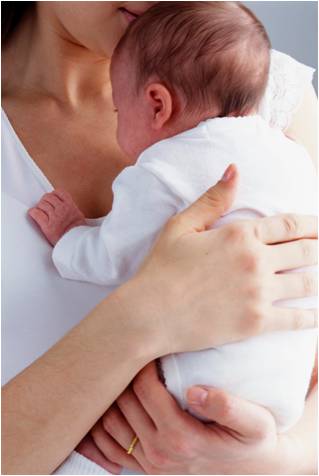 Acupuncture and Herbs can help ovulation, menstruation and fertility. It can also help remedy most ovulation problems and menstrual disorders by helping your body come to hormonal and endocrine balance.
Acupuncture and Herbs can help ovulation, menstruation and fertility. It can also help remedy most ovulation problems and menstrual disorders by helping your body come to hormonal and endocrine balance. Acupuncture increases blood flow to all reproductive organs; this increased blood flow means that the organs are supported as they receive the maximum amounts of oxygen and nutrients, and that hormones are being adequately produced or regulated. From a Chinese medicine perspective, the body’s “Qi” is allowed to flow freely, healing and nourishing the body it is naturally meant to do. Acupuncture can improve and balance all the phases of the menstrual cycle.
The more you know, the more you can feel comfortable and in control of your body’s natural process. A woman’s body is naturally a fertile place when the body is in balance. Whether or not you are trying to get pregnant, your monthly cycle is an important part of your overall health and well-being. Learn what happens during the different parts of your ovulation and menstrual cycle as an egg develops, matures and is fertilized. The more you know, the more you can feel comfortable and in control of your body’s natural process.
Ovulation, Menstruation and Fertilization: The Biology Basics
Ovulation is the process by which a mature egg is released from the ovary. Ovulation happens each month as a part of the menstrual cycle, and occurs approximately in the middle of the cycle days. The process of ovulation is triggered when the hormone FSH (Follicle Stimulating Hormone) is released by the pituitary gland.
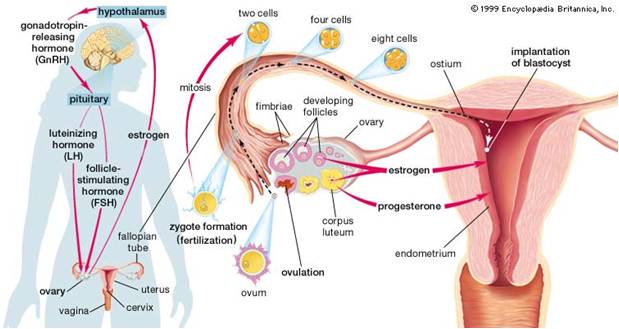 Before actual ovulation occurs, hormones cause several follicles in the ovary to begin developing into mature eggs. As the follicles mature, usually one egg becomes dominant, and the others dissolve. The dominant egg is then released from the ovary, and travels down the fallopian tube. In the fallopian tube, the egg may be fertilized by sperm.
Before actual ovulation occurs, hormones cause several follicles in the ovary to begin developing into mature eggs. As the follicles mature, usually one egg becomes dominant, and the others dissolve. The dominant egg is then released from the ovary, and travels down the fallopian tube. In the fallopian tube, the egg may be fertilized by sperm. If fertilization occurs, the egg becomes a zygote that can attach to uterine lining and develop into a fetus.
When am I Fertile? Understanding Ovulation
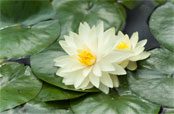 Your optimal fertile time is normally 24-36 hours before you ovulate. This means that the most effective time for you to plan to have intercourse is during this period. You have the most chance of success in conceiving during this time.
Your optimal fertile time is normally 24-36 hours before you ovulate. This means that the most effective time for you to plan to have intercourse is during this period. You have the most chance of success in conceiving during this time. If you want to become pregnant, it is extremely helpful to know your body’s cycle, and your time of ovulation. This is when an egg that is mature and ready to be fertilized by a sperm as it travels from the ovaries toward the uterus via the fallopian tube. During this time period is the optimal time for sperm to be introduced into the system so that they can make the trip toward the egg. One determining signal of your ovulation schedule is your cervical mucus. You can examine the quality of your cervical mucus to calculate when you will ovulate. Your cervical mucus can be a key sign that your body is preparing to release an egg and therefore is at its most fertile. During this most fertile time period, your cervical mucus can have an appearance like raw egg whites. Cervical fluid should be abundant, slippery, and have a stringy texture: it can be apparent on the inside of your underwear or on toilet paper, or even when you hold it between your fingers.
Ovulation predictor kits or fertility monitors can also help you determine when you ovulate. These kits test your urine for lutenizing hormone (LH), which allows you to chart hormonal surges to pinpoint the days in which you are most fertile, and are available online or in most drugstores. Once you have some experience measuring your fertility signs, you will probably develop an eye for your personal fertility indicators.
Learn to Track Ovulation Cycle
 Although it doesn’t necessarily tell you when to have intercourse, you can accurately chart your cycle using the Basal Body Temperature (BBT) charting method. It can be useful for establishing your body’s ovulation pattern, and can verify that ovulation did in fact occur. Using this method, you will examine your temperature changes throughout your cycle to determine when ovulation occurs: the day after ovulation, a woman’s body temperature rises. It is important to note that to get an accurate BBT read you must measure your temperature orally with a special BBT thermometer (available online or at most drug stores) at the same time in the morning each day, immediately when you wake up, and before you get out of bed.
Although it doesn’t necessarily tell you when to have intercourse, you can accurately chart your cycle using the Basal Body Temperature (BBT) charting method. It can be useful for establishing your body’s ovulation pattern, and can verify that ovulation did in fact occur. Using this method, you will examine your temperature changes throughout your cycle to determine when ovulation occurs: the day after ovulation, a woman’s body temperature rises. It is important to note that to get an accurate BBT read you must measure your temperature orally with a special BBT thermometer (available online or at most drug stores) at the same time in the morning each day, immediately when you wake up, and before you get out of bed. Although the chart may look very detailed, it can be helpful to know that the most important things to chart are your temperature, the quality of your cervical fluid, the time of intercourse, and the time and quality of your period days (heavy, medium, light). The effectiveness of charting your cycle depends on many factors (included in the chart), that can be better understood and utilized by meeting with the practitioner. Traditional Chinese medicine, which can include acupuncture and herbal treatments, can help regulate your cycle, hormone levels and reproductive system as a whole, guiding your body to be the most fertile, healthy place to carry a child.
After ovulation, a woman’s body prepares the uterus to host a fertilized egg. When a woman ovulates, the egg will burst from the follicle. Then what is left of the follicle will become the corpus luteum. The corpus luteum produces the hormone progesterone in order to prepare the uterine lining (which has developed throughout the menstrual cycle) to become receptive to implantation. The corpus luteum produces progesterone until the placenta begins to take over progesterone production around ten weeks of gestation. If the egg is not fertilized, it will dissolve in the uterus, and uterine lining will be lost during menstruation. If this takes place, the menstrual cycle then will begin all over again.
Acupuncture and Herbs for Fertility, IVF and IUI
Acupuncture can be an invaluable tool to help promote healthy conception and a healthy early pregnancy. Our goal is to support your hope, joy and health during that process, and ensure that mother and baby achieve a healthy, full-term pregnancy.
How Acupuncture and Herbs Support IVF and Why It Works
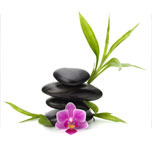 You’ve heard that acupuncture might benefit you as you try to conceive, but you want to know more about why and how. Acupuncture and herbs have been proven to increase the success rate of potential parents trying to conceive through the process of in-vitro fertilization. Because traditional Chinese medicine treats the root cause of infertility problems, and views the body as a whole, as your overall health improves, so does your reproductive system.
You’ve heard that acupuncture might benefit you as you try to conceive, but you want to know more about why and how. Acupuncture and herbs have been proven to increase the success rate of potential parents trying to conceive through the process of in-vitro fertilization. Because traditional Chinese medicine treats the root cause of infertility problems, and views the body as a whole, as your overall health improves, so does your reproductive system. Acupuncture can help increase your chances of success when going through the IVF process. I'd love to have the privilege of helping to support you.
Traditional Chinese Medicine, both Acupuncture and Herbs- is very effective in aiding IVF conception. Some studies suggest that it can increase chances of success for conception up to 35% when acupuncture is performed on IVF patients.
Traditional Chinese Medicine (TCM) is so effective because it treats the root cause of fertility problems. Each treatment begins with a thorough intake exam investigating the patients overall health and his or her individual infertility symptoms. Once we know the root cause of the problem, we can then treat the patient with an individual regimen of acupuncture and herbs. Treatment is designed to bring the patient to optimum overall health and optimum reproductive capability.
We suggest that, ideally, IVF patients receive the benefits of acupuncture and herbal treatments about 3 months before undergoing the IVF procedure. This time allows the patient’s body to prepare for the best possible reproductive health. While this time frame may seem long, TCM can actually save the patient time, energy and money; a healthy body primed by acupuncture and herbal medicine is much more likely to successfully conceive in the first cycle of IVF.
Once you have conceived, TCM will also help you maintain a healthy pregnancy. TCM regulates the reproductive system, lowering the rate of ectopic pregnancy and miscarriage (see medical articles). It is an effective, natural way to help mothers carry a healthy pregnancy to term.
Please also rest assured that acupuncture and herbal treatments are painless and very safe. Instead of introducing more drugs or hormones into the body, acupuncture and herbs regulate the body naturally. The mother is safe, and you have no worries of exposing your child to harmful chemicals in utero. Please also note that if you are interested in acupuncture to enhance fertility, you should find a practitioner who specializes in reproductive matters. Doing this ensures maximum safety for both mother and child.
Acupuncture for Fertility, IVF, IUI: When to Start Treatments
Acupuncture for fertility can be started at any point in the menstrual cycle or at any point before a medically administered fertility treatment to enable the body to be as healthy as possible for conception. The more time before ovulation or retrieval, the better, because the benefits of acupuncture are cumulative. So, three treatments to increase blood flow to the uterus and ovaries will be more effective than one treatment, however, acupuncture can always benefit the process, no matter when you start.
Acupuncture treatments for fertility ideally coincide with the phases of a woman's menstrual cycle, and with their complementary treatment, which can include IUI (Intra-Uterine Insemination) and IVF (In-Vitro Fertilization). Typically, it is normal to expect to receive acupuncture treatment four times during your cycle.
In-Vitro Fertilization (IVF) and Acupuncture
On Cycle day One (your menstrual and IVF cycle coincide), a fertility doctor will start a woman on birth control to “quiet the ovaries”. From a Chinese medicine perspective, this is a chance for a woman to accumulate resources, or build up a reserve of energy and blood, giving the body a rest. A doctor might also use Lupron, which suppresses the whole system/cycle. A fertility doctor also may do nothing at this point.
On Cycle Day Three, a woman is injected with hormones to produce more than 1 or 2 follicles, which is a normal amount without additional hormones. A larger amount of follicles is the goal; this is called the Follicle Stimulation part of the cycle.
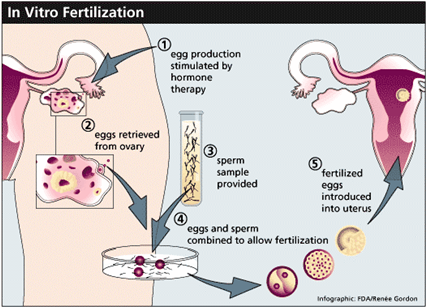 For those women undergoing IVF, acupuncture treatments are given before egg retrieval and before embryo transfer. If an IVF cycle is more than a month away, acupuncture and some herbs can be used to build up a mother's resources and correct imbalances in preparation for the coming cycle.
For those women undergoing IVF, acupuncture treatments are given before egg retrieval and before embryo transfer. If an IVF cycle is more than a month away, acupuncture and some herbs can be used to build up a mother's resources and correct imbalances in preparation for the coming cycle. First Acupuncture Treatment: this treatment occurs sometime within cycle day 5-8 during Follicle Stimulation to help strengthen that process.
Second Acupuncture Treatment: This happens within cycle day 9-13, before retrieval. Within 24 hours of the retrieval is ideal, but within 48hrs is still effective. This is the same type of treatment as the first treatment. The retrieval, or the gathering of the new follicles, happens under anesthesia. There is a period of 3-5 days between the retrieval and transfer, which is the inserting of the fertilized eggs back into the uterus via the cervix.
Third Acupuncture Treatment: this takes place at least 48 hours pre-transfer. If possible, an acupuncture treatment immediately before the transfer is ideal. This treatment helps thicken the uterine lining and open the cervix to make it easy for a smooth transfer.
Fourth Acupuncture Treatment: this takes place 3-5 days Post-transfer. This is called the “implantation treatment”. It is necessary to help an embryo attach to the uterine lining and begin to grow.
There are no necessary acupuncture treatments for a couple of weeks. After this time, after a positive pregnancy test, a woman will receive treatment to help the new embryo grow, and reduce the chance of miscarriage. If a woman gets her period, she can begin the process again, or receive treatment to rebalance and restrengthen the body to prepare for a subsequent cycle of fertility treatments.
Intra-Uterine Insemination (Artificial Insemination)
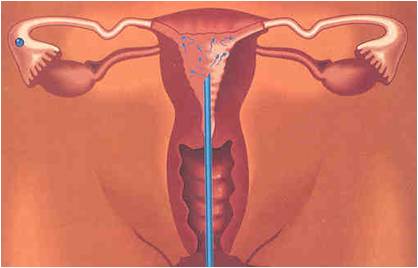 A woman may be taking hormones, like the medication Clomid, to produce more follicles, before she begins acupuncture treatments, or she may not be taking anything.
A woman may be taking hormones, like the medication Clomid, to produce more follicles, before she begins acupuncture treatments, or she may not be taking anything. First Acupuncture Treatment: this occurs within cycle day 3-7 during Follicle Development to help strengthen that process.
Second Acupuncture Treatment: this happens within the 2nd week of the cycle, or pre-ovulation. At this point it is likely that the sperm are “washed” and only the strong ones will be injected directly into the uterus.
Third Acupuncture Treatment: this happens 3-5 days after the IUI. A woman will know when she is “peaking” or ovulating, and will do so within 24-36 hours. The IUI is done at this point. This acupuncture implantation treatment is key for helping embryos attach and grow.
Fourth Acupuncture Treatment: this can be done about 2 weeks after the implantation treatment. It takes place after a positive pregnancy test, and helps reduce the chance of miscarriage. If a woman gets her period, she can begin the treatment cycle again, or choose to rest and rebalance with or without acupuncture treatments.
Infertility Issues We Treat
Endometriosis and Thin Endometrial Lining
Acupuncture and herbal treatments for endometriosis can reduce abnormal endometrial growth and decrease the pain associated with this disorder. Acupuncture naturally regulates the endocrine/hormonal system and the body’s immune functions so that the endometrial cells are discouraged to grow outside the womb. By enhancing your immune function, acupuncture can help a woman’s body break down clots and masses, and eliminate any existing endometrial cells outside of the uterus.
What is Endometriosis?
Endometriosis can only be diagnosed surgically; a diagnosis is given when abnormal growth of endometrial cells occurs outside of the endometrium, which is the inner lining of the uterus. The exact cause of endometriosis is unknown, however, it is theorized that it is due to menstrual blood backing up into the fallopian tubes and into the abdominal cavity when it is not fully discharged. Another theory explains that non-endometrial cells inexplicably change into endometrial cells and respond hormonally the same way. Symptoms of endometriosis can include pain as the abnormal endometrial cells attempt to be shed and leave the body during menstruation. Since these abnormal cells sometimes have no clear exit path, it can build up and cause scar tissue within the abdominal space, sometimes causing adhesions severe enough to bind the organs of the abdomen together.
Irregular, Painful or Heavy Periods
Acupuncture can help restore your menstrual cycle naturally and gently. When your period is irregular, exceptionally heavy or painful, it points to an imbalance in your body's natural Qi ("chee"). Traditional Chinese Medicine views irregularity or pain as symptoms of this fundamental imbalance.
When we investigate the irregularities in your periods, we can determine the root cause of the problem, and treat the imbalances which have led to your menstrual irregularities. Acupuncture and herbs can help reduce anxiety, and regulate reproductive hormones. This treatment results in a healthy, regular menstrual cycle. Acupuncture and herbal treatments can also help reduce the pain associated with menstrual periods, as well as other PMS symptoms.
PCOS (Polycystic Ovarian Syndrome)
Traditional Chinese Medicine—both acupuncture and herbs—offers natural and effective treatment for PCOS.
You are not alone. It is estimated that 10% of all women suffer from some form of Polycystic Ovarian Syndrome (PCOS). Up to 30% of all women have symptoms of the condition. PCOS is diagnostically a blanket term to describe the condition of infertility related to irregularity or difficulty with ovulation.
Traditional Chinese Medicine, both acupuncture and herbs, can get to the root of PCOS, and help a woman restore her health naturally. Acupuncture treats PCOS by restoring balance to a woman’s nervous system and endocrine system. Treatment can: stabilize hormonal cycles, balance endocrine function, regulate periods, stabilize emotions, support regular sleep patterns, and reduce stress. Acupuncture will also send blood and nutrients to the pelvic cavity, helping restore optimal health to the reproductive organs. Acupuncture and herbs have also been effective in removing the telltale waxy coating on PCOS patients’ ovaries, thereby restoring ovarian health. All this is done naturally—without introducing more drugs or hormones into a woman’s body.
Researchers speculate that women develop PCOS because of an inherited predisposition for the disease, or because of problems associated with a diet consisting of foods high in fat, high in sugar, and highly-processed. PCOS is one of the foremost causes of infertility in women of childbearing age. If a woman suffers from PCOS, it is important for her to understand the condition and know her treatment options.
The symptoms of PCOS are varied. The most common problems associated with the disease is a disrupted menstrual cycle. Women with PCOS often complain of irregular periods, or long periods accompanied by painful cramps. Other markers for PCOS are hirsutism (unusual amounts of hair growth), acne, pelvic pain, weight gain, low pregnancy rate, and high miscarriage rate. Polycystic Ovarian Syndrome is also related to blood sugar problems, high cholesterol, high blood fat, high blood pressure, diabetes, heart disease and hypertension. Because of these related problems, PCOS is a disorder that can drastically affect a woman’s long-term health, and treatment options should not be ignored.
Insulin-related PCOS
Traditionally, PCOS is a reproductive disorder related to insulin resistance. When a woman has high blood insulin levels, her hormonal balance becomes disrupted, and she produces too much testosterone. When this happens, ovaries are exposed to an unusually high level of androgens (male sex hormones) —particularly testosterone— and do not function normally within the hormonal reproductive cycle.
When a woman suffers from PCOS, normal ovulation doesn’t occur. Ovaries produce follicles, but the eggs don’t mature properly in the testosterone-rich environment, so a woman doesn’t ovulate. The stagnated follicles become cysts, and these cysts secrete more androgens. The disorder then becomes a cycle that feeds on itself.
There are several treatment options for PCOS—both in the worlds of Western and Eastern medicine. Western medicine treats PCOS with a regimen of drugs. Usually a doctor will prescribe medicine to address issues of hormonal disruption, and, on occasion, issues of insulin resistance. These drugs, like clomid, hCG and gonadotrophins, can restore a regular menstrual cycle.
Hormone drug-treatments may, indeed, help restore ovulation, however, they do not treat the root cause of the hormonal imbalance. Ovaries will still be subject to high levels of androgens, possibly resulting in lower quality eggs, and a less-than-optimal fetal environment. As a result, fertility issues and miscarriage may still occur.
The second major concern with these drugs and any birth control drugs is the long-term effect on the body. While the pill may initially seem to help with PCOS, it may worsen the condition after a few years. Birth control pills can make the body more insulin-resistant, which is the root reason a woman experiences elevated testosterone levels in the first place.
If a woman suffers from Polycystic Ovarian Syndrome, there are also steps she can take on her own to reclaim better health. Women experiencing PCOS should avoid sugars and simple carbs to help cope with problems of insulin resistance. Small meals will also assist the body in maintaining normal insulin levels, and eating small amounts of protein at each meal with help level blood sugar. Patients may also want to avoid processed foods because the chemicals found in these foods can disrupt an already sensitive body chemistry. Smoking and alcohol consumption should be kept to a minimum. Cold food and drinks should be avoided because they slow a woman’s metabolism, and PCOS patients already suffer from low metabolic function. Women who have PCOS should try to eat lots of vegetables, and make sure they have essential fatty acids in their diet; essential fatty acids have a regulatory effect on hormone levels. Finally, PCOS patients should make sure they get plenty of rest, and manage stress for optimum health.
Fibroids
Fibroids can interfere with a woman’s ability to get pregnant by disrupting hormonal balance, or by blocking the uterine cavity or fallopian tubes. Western medicine treats fibroids in two ways. The first way is with surgery, and the second is with drugs. The most common of these drug treatments is Lupron, which puts the body into artificial menopause. Clearly both treatment options create obstacles to fertility.
Traditional Chinese Medicine treats fibroids differently. Acupuncture and herbal treatments can successfully shrink away small fibroids (about 1cm) by up to 92%. By reducing fibroids, TCM reduces potential blockage to the uterus and fallopian tubes, and resets any hormonal imbalances caused by the fibroid masses.
With larger fibroids, treatments are focused on decreasing the bleeding and pain associated with fibroids as well as preventing them from growing larger. When these symptoms decrease and fibroids are no longer growing, patients can often avoid surgery. However, it is helpful to note that it is unlikely that treatment will completely eliminate larger fibroids. If a patient has had surgery to remove larger fibroids, acupuncture can play a key role in the prevention of new fibroid growth.
Amenorrhea (No period) and Anovulation
Anovulation is a lack of ovulation, or when an egg is not released from the ovaries during a woman's menstrual cycle. Having no ovulation can often be the cause of infertility.
Amenorrhea is a lack of blood flow, or a missed period. Symptoms of ovulation and menstrual disorders include having no periods or an irregular menstrual cycle, and a lack of a rise in basal body temperature during the expected time at midcycle.
Acupuncture and herbs can help remedy most ovulation problems and menstrual disorders by helping your body come to hormonal and endocrine balance.
Acupuncture increases blood flow to all reproductive organs; this increased blood flow means that the organs are supported as they receive the maximum amounts of oxygen and nutrients, and that hormones are being adequately produced or regulated. From a Chinese medicine perspective, the body’s “Qi” is allowed to flow freely, healing and nourishing the body is it is naturally meant to. Often, the most likely cause for many ovulation and menstrual problems is a disruption in the endocrine system. There may be a problem with the pituitary or hypothalamus, which regulate reproductive hormones. A woman might be suffering from a disorder like Polycystic Ovarian Syndrome (PCOS), for instance, which causes hormone disruptions. There also may be too little or too much estrogen in a woman’s body. A lack of ovulation is not always the cause of infertility: other unrelated infertility issues may or may not be a cause, like endometriosis, fibroids, or stress. If your menstrual cycle is irregular due to the cessation of oral contraceptives, acupuncture and Chinese medicine can help your body return to a natural cycle.
If you are not pregnant, some common causes of no period or irregular menstrual cycle, including no ovulation, are:
• low body weight
• obesity
• anorexia or bulimia
• intense exercise or endurance training
• stress on the body, which can include emotional swings, illness, or travel
• birth control medication, and other medications
• hormone imbalances, including thyroid issues
• use of illegal drugs
• PCOS (polycystic ovarian syndrome)
• breast feeding – often a period will not return until breast feeding is complete
Acupuncture increases blood flow to all reproductive organs; this increased blood flow means that the organs are supported as they receive the maximum amounts of oxygen and nutrients, and that hormones are easily moving through the body. If your menstrual cycle is irregular due to the cessation of oral contraceptives, Chinese medicine can help your body return to a natural cycle.
Additionally, we provide treatments for stress, endometriosis, PMS, cramps and other problems that can disrupt a normal menstrual cycle. Acupuncture treatments can reduce anxiety—a major factor in hormone imbalances. Usually within three to six months of regular treatment, acupuncture patients will experience drastic improvement with ovulation and menstrual health that is ongoing. Best of all, they can experience these benefits naturally and without the use of synthetic hormones or other drugs.
If having no period is caused by weight problems, we are happy to support you in finding a healthy relationship to your weight that helps you achieve greater reproductive health. Chinese medicine views food as one of the nourishing building blocks to good health. Often, certain foods consumed can affect the body’s qi. An adjustment in the kinds of foods you eat, adding some and eliminating others, can help readjust your systems to work more optimally. A healthier you in general mean that every aspect of your body becomes healthier, naturally.
Poor Egg Quality
Poor Egg Quality means that a woman’s eggs might not respond to fertilization or develop into a healthy embryo. Poor egg quality is due to chromosomal abnormalities, or low quality mitochondria in the egg. (Mitochondria provide energy to the egg, and fuel embryonic cells when they divide.) Poor egg quality is usually due to aging.
Traditional Chinese Medicine, which includes both acupuncture and herbs, can help restore the patient’s health and therefore boost egg quality. By increasing blood flow to the ovaries, increasing nourishment and oxygen supply to the reproductive organs, and stabilizing reproductive hormones, a woman’s chance of conceiving is increased. A well-nourished ovary produces better quality eggs and strong healthy embryos.
Blocked Tubes / Spasmed Tubes
The only remedy to actual blocked tubes (due to scarring) is surgery. Many “blocked tube” diagnosis, however, are actually due to tubal spasms. If this is the case, acupuncture can help reduce stress, and regulate the function of the fallopian tubes. Once you have eliminated these tubal spasms, normal fertility can be restored. Tubal blockage may also be due to an overabundance of phlegm. If this is the case, acupuncture and herbs can be used to clear the phlegm and get your fallopian tubes functioning in a healthy way.
Luteal Phase Defect
Luteal Phase Defect occurs when there is a post-ovulation progesterone deficiency. When this happens, uterine lining will not be receptive to implantation, and embryos will not attach. Acupuncture and herbs will help regulate endocrine function so that progesterone levels will stabilize with treatment. It is recommended that a woman seeking acupuncture to regulate FSH levels, and increase healthy functioning come in for treatment every two weeks. Generally these visits should be in sync with her cycle. Herbal treatments can be prescribed to increase the effectiveness of acupuncture treatments in the meantime.
Stress
There is no need for your body to suffer the affects of stress without protection. Acupuncture treatments can help rebalance and restructure to help you be better equipped to handle everyday stress and allow your body to be its most fertile.
Stress can interfere with both male and female infertility. The physical response to stress is the development of muscle tension and blood vessel constriction, as well as endocrine system imbalances. In this tense state, blood, nutrients and energy do not freely flow to reproductive organs, and hormones may become out of balance. Acupuncture and herbs can help reset the nervous system so that the patient feels more relaxed, and his or her body can return to a free and healthy state. When health is restored, the reproductive system will function at optimum potential. Treatment of stress is an integral part of every fertility treatment because the process itself of trying to conceive can be very stressful.
Idiopathic Infertility
Idiopathic infertility means that doctors have not been able to find a cause for the infertility. When this happens, we urge patients to get a thorough examination by a doctor of Traditional Chinese Medicine (TCM). TCM may be able to identify health issues that western doctors do not see because TCM practitioners look at the body through a completely different paradigm; Eastern medicine is often able to tune in to the subtleties of reproductive health in a way that Western medicine is not. Once we discover the root cause of the infertility, we can offer treatment plans for any imbalances we find. Our goal would be to bring your body to optimum health, so that your reproductive health, and ability to conceive are truly optimized.
Repeated Miscarriage
Chronic miscarriage is often the symptom of problems such as stress, an overactive immune system, blood clotting, hyperprolactinemia, active NK cells, or DNA abnormalities in eggs or sperm. Acupuncture and herbs can treat all of these issues, and therefore support healthy implantation and fetal gestation. Acupuncture first prepares the body for pregnancy, and helps the body create higher-quality embryos.
Then, once the healthy embryo is created, TCM treatments will support the body in maintaining the pregnancy once implantation has occurred. Acupuncture and herbs work because they regulate immune response, increase the flow of blood and nutrients to the uterus, improve the quality of uterine lining, and regulate hormonal balances.


